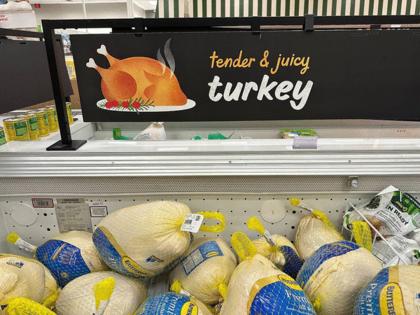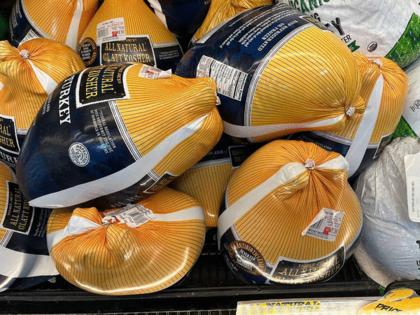Is it safe to eat turkey this Thanksgiving amid bird flu outbreak? Here's what experts say
Published in Health & Fitness
Is your Thanksgiving turkey safe to eat?
As poultry farms and dairies across California continue to battle bird flu outbreaks, residents may be worried about food safety this holiday season.
Highly pathogenic avian influenza surfaced in the United States in January 2022, the virus has been detected in wild birds and domestic poultry, according to the Fresno Bee’s previous reporting.
As of Nov. 18, a total of 294 dairies in California were under quarantine due to the avian flu, state agriculture officials confirmed.
More than 4 million turkeys and chickens have been killed at poultry ranches across the state in an attempt to stop the virus from spreading.
Meanwhile, the bird flu virus was detected in a batch of raw milk from Raw Farm in Fresno County, the California Department of Public Health reported.
The Fresno Bee talked to María Soledad, a food safety inspection service spokeswoman at the U.S. Department of Agriculture, to learn more about the virus and how it affects food safety.
What is bird flu?
According to the U.S. Food and Drug Administration, highly pathogenic avian influenza — also known as bird flu or H5N1 — is a highly contagious and often deadly disease primarily found in poultry.
It is “caused by highly pathogenic avian influenza A (H5) and A (H7) viruses,” the agency said on its website.
HPAI can spread from wild birds to domestic poultry and other animals. The virus can also infect humans in rare cases.
“It is important to note that ‘highly pathogenic’ refers to severe impact in birds, not necessarily in humans,” the agency said.
How is avian flu spread to humans?
Unlike seasonal influenza viruses, which are typically contracted through human-to-human transmission, avian influenza viruses are spread by infected birds through saliva, mucus and feces, according to the CDC.
The virus can also be present in the respiratory secretions, organs, blood, or body fluids of other infected animals — including milk.
Human infections occur when the virus enters the eyes, nose or mouth, or is inhaled through airborne droplets, aerosol particles or dust. It can also be transmitted by touching contaminated surfaces and then touching the face.
“Illness in humans from avian influenza virus infections have ranged in severity from no symptoms or mild illness to severe disease that resulted in death,” the CDC said.
Can I get bird flu from eating Thanksgiving turkey?
“Consumers can safely enjoy turkey this holiday season,” the U.S. Food and Drug Administration wrote in an email to The Bee, noting that food safety inspectors examine turkeys for disease “before and after slaughter.”
That includes your Thanksgiving bird.
“The turkeys from farms with confirmed avian influenza don’t even get sent to slaughter,” Soledad said. “They are destroyed on premises.”
During an avian flu outbreak, “The chance of infected poultry or eggs entering the food chain is low,” the FDA said on its website in April, “because of the rapid onset of symptoms in poultry as well as the safeguards in place, which include testing of flocks and federal inspection programs.”
“When food is properly prepared and stored, the risk of consumers becoming infected with HPAI is reduced even further,” the FDA said.
What’s the safest way to prepare turkey?
UC Davis professor Linda J. Harris, who focuses on microbial food safety, says you should prepare your Thanksgiving turkey using four essential steps: clean, cook, chill and separate.
•Clean: Wash your hands, wash utensils and surfaces after each use. Wash fruits and vegetables.
•Cook: Food is safely cooked when the internal temperature is high enough to kill germs that can make you sick.
•Chill: Refrigerate perishable foods within two hours.
•Separate: Use separate cutting boards and plates for produce, meat, poultry, seafood and eggs.
You can watch the U.S. Food and Drug Administration’s Holiday Food Safety video for tips on how to prepare a turkey the safe way, or check out the turkey recipe developed by the Partnership for Food Safety Education, a nonprofit organization that works to reduce food-borne illness risks.
According to the USDA, any traces of highly pathogenic avian influenza in your turkey are inactivated when food reaches an internal temperature of 165 degrees.
The USDA recommends following this rule anytime you’re preparing raw poultry, including chicken.
On its Thanksgiving food safety website, the USDA has videos and information including calculators that help you determine the appropriate amount of time to thaw and cook your turkey.
“Simply select your turkey’s weight, along with your preferred thawing and cooking methods, and you’ll immediately receive guidance on how to safely prepare your turkey this Thanksgiving!’ USDA congressional public affairs specialist Maria Machuca wrote in an email to The Bee.
Can I get bird flu by drinking or cooking with milk?
“There is no evidence that the virus can be transmitted to humans through properly prepared food,” the U.S. Food and Drug Administration said on its website.
Pasteurized milk and other dairy products are safe to consume and cook with, according to Hebah Ghanem, infectious disease specialist at University of California San Francisco, Fresno.
“The most important thing that it has to be pasteurized, because the virus is killed with heat,” Ghanem told The Bee.
“Pasteurization of milk was adopted decades ago as a basic public health measure to kill dangerous bacteria and largely eliminate the risk of getting sick,” the FDA said on its website.
Will eating eggs make me sick?
All egg products are pasteurized as required by the U.S. Department of Agriculture.
“This means that they have been rapidly heated and held at a minimum required temperature for a specified time to destroy bacteria,” the agency said.
However, eggs that are still in their shells aren’t required to be pasteurized, leading to potential health risks if eaten raw or uncooked.
What are avian flu symptoms?
According to the CDC, avian flu symptoms in humans may include:
•Fever or feeling feverish or chills
•Eye redness or irritation
•Cough
•Sore throat
•Runny or stuff nose
•Muscle or body aches
•Headaches
•Tiredness
How dangerous is HPAI for humans?
California dairy workers infected with avian flu have experienced mild flu-like symptoms, The Bee previously reported.
“All the cases that we have here in California are very mild,” Ghanem told the Fresno Bee in October. “They haven’t needed hospitalization.”
What’s the best way to avoid the virus?
To prevent the spread of highly pathogenic avian influenza, people should avoid exposure to dead animals, Ghanem said in October. That includes wild birds, poultry, other domesticated birds and cows.
People should also avoid exposure to animal feces as well as fluids.
Here are other tips from Ghanem:
•Wash your hands
•Avoid contaminated surfaces and any other material that has been touched or is close to the infected animal
•Don’t drink raw milk.
•Eat pasteurized cheese.
•Monitor yourself for symptoms
•Get the flu vaccine
©2024 The Sacramento Bee. Visit at sacbee.com. Distributed by Tribune Content Agency, LLC.















Comments